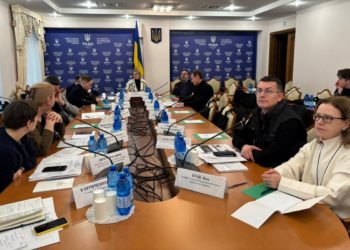The russian-controlled “Dzhankoi District Court” fined Crimean Tatar journalist and human rights activist Lutfiye Zudiyeva RUB 30,000 under a protocol on conducting activities of a “foreign agent” without submitting a corresponding application, Crimean Solidarity reports.
The russian ministry of justice decided to include the journalist in the register of “foreign agents” on May 16 of this year, believing that she was “under foreign influence.” This is the first case of recognizing journalists from among the Crimean Tatars as “foreign agents” in Crimea.
The journalist appealed this decision of the ministry of justice in court. She submitted an explanation for the protocol drawn up against her. She indicated that the russian ministry of justice in Crimea considered her public and media activities “political.” However, she is not such and does not fall under the resolution specified in the law.
In addition, Lutfiye Zudiyeva noted that the case lacks evidence of “foreign influence” allegedly exerted on her. And the very provision of the law on “foreign agents” is formulated vaguely and can be applied arbitrarily by the authorities.
The journalist also emphasized that bringing her to justice under an administrative article would violate her right to freely express her opinion, enshrined in the Constitution of the russian federation and international treaties. Zudiyeva asked to dismiss the case. She stated that her actions did not constitute an offense.
Together with her lawyer, Zudiyeva plans to file an appeal against the decision of the Dzhankoi City Court.
Zudiyeva has previously been persecuted by the russian authorities. On February 22, 2024, russian security forces searched her home in Dzhankoi. She was accused of “abuse of freedom of the mass media” for reposting materials from Radio Liberty without labeling the media outlet as a foreign agent. At the end of March of the same year, it became known that the russian-controlled Kyiv District Court in Simferopol had fined the Crimean woman RUB 2,500 under the article “abuse of freedom of the mass media.” Legislation on so-called “foreign agents” appeared in russia in 2012. The law allowed the russian ministry of justice to recognize non-profit organizations as foreign agents if they receive funding from abroad and conduct political activities. Later, it became possible to recognize media outlets and individuals as agents, including those that do not receive foreign funding but are “under foreign influence.” Russian legislation does not specify what exactly constitutes foreign influence.
NUJU Information Service

 THE NATIONAL UNION OF
JOURNALISTS OF UKRAINE
THE NATIONAL UNION OF
JOURNALISTS OF UKRAINE















Discussion about this post